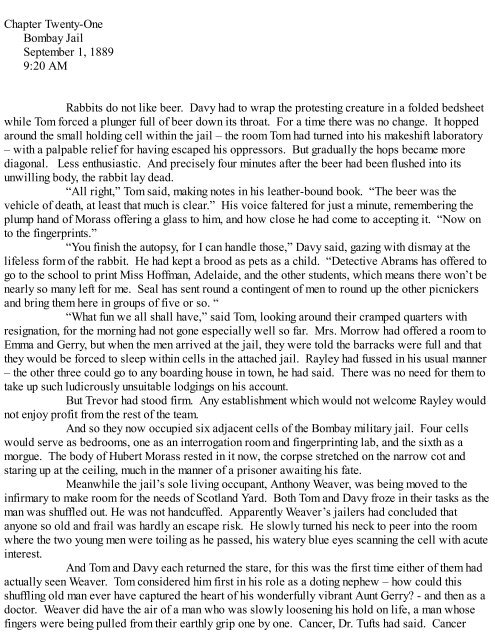Create successful ePaper yourself
Turn your PDF publications into a flip-book with our unique Google optimized e-Paper software.
Chapter Twenty-One<br />
Bombay Jail<br />
September 1, 1889<br />
9:20 AM<br />
Rabbits do not like beer. Davy had to wrap the protesting creature in a folded bedsheet<br />
while Tom forced a plunger full of beer down its throat. For a time there was no change. It hopped<br />
around the small holding cell within the jail – the room Tom had turned into his makeshift laboratory<br />
– with a palpable relief for having escaped his oppressors. But gradually the hops became more<br />
diagonal. Less enthusiastic. And precisely four minutes after the beer had been flushed into its<br />
unwilling body, the rabbit lay dead.<br />
“All right,” Tom said, making notes in his leather-bound book. “The beer was the<br />
vehicle of death, at least that much is clear.” His voice faltered for just a minute, remembering the<br />
plump hand of Morass offering a glass to him, and how close he had come to accepting it. “Now on<br />
to the fingerprints.”<br />
“You finish the autopsy, for I can handle those,” Davy said, gazing with dismay at the<br />
lifeless form of the rabbit. He had kept a brood as pets as a child. “Detective Abrams has offered to<br />
go to the school to print Miss Hoffman, Adelaide, and the other students, which means there won’t be<br />
nearly so many left for me. Seal has sent round a contingent of men to round up the other picnickers<br />
and bring them here in groups of five or so. “<br />
“What fun we all shall have,” said Tom, looking around their cramped quarters with<br />
resignation, for the morning had not gone especially well so far. Mrs. Morrow had offered a room to<br />
Emma and Gerry, but when the men arrived at the jail, they were told the barracks were full and that<br />
they would be forced to sleep within cells in the attached jail. Rayley had fussed in his usual manner<br />
– the other three could go to any boarding house in town, he had said. There was no need for them to<br />
take up such ludicrously unsuitable lodgings on his account.<br />
But Trevor had stood firm. Any establishment which would not welcome Rayley would<br />
not enjoy profit from the rest of the team.<br />
And so they now occupied six adjacent cells of the Bombay military jail. Four cells<br />
would serve as bedrooms, one as an interrogation room and fingerprinting lab, and the sixth as a<br />
morgue. The body of Hubert Morass rested in it now, the corpse stretched on the narrow cot and<br />
staring up at the ceiling, much in the manner of a prisoner awaiting his fate.<br />
Meanwhile the jail’s sole living occupant, Anthony Weaver, was being moved to the<br />
infirmary to make room for the needs of Scotland Yard. Both Tom and Davy froze in their tasks as the<br />
man was shuffled out. He was not handcuffed. Apparently Weaver’s jailers had concluded that<br />
anyone so old and frail was hardly an escape risk. He slowly turned his neck to peer into the room<br />
where the two young men were toiling as he passed, his watery blue eyes scanning the cell with acute<br />
interest.<br />
And Tom and Davy each returned the stare, for this was the first time either of them had<br />
actually seen Weaver. Tom considered him first in his role as a doting nephew – how could this<br />
shuffling old man ever have captured the heart of his wonderfully vibrant Aunt Gerry? - and then as a<br />
doctor. Weaver did have the air of a man who was slowly loosening his hold on life, a man whose<br />
fingers were being pulled from their earthly grip one by one. Cancer, Dr. Tufts had said. Cancer
















